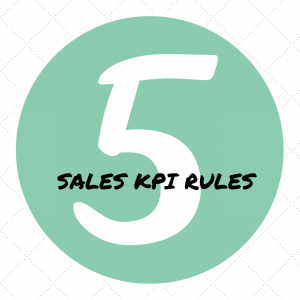 Through my experience as owner of The Harris Consulting Group, I’ve come across businesses big and small across all industries, and one thing remains true: Every sales organization needs a sales approach driven by key performance indicators (KPIs).
Through my experience as owner of The Harris Consulting Group, I’ve come across businesses big and small across all industries, and one thing remains true: Every sales organization needs a sales approach driven by key performance indicators (KPIs).
Sales KPIs are both money makers and career builders. Implementing a sales KPI strategy indicates maturing of an organization. If you’re a sales manager, the purpose is to help your team get better at what they do and make more money at the same time. Nobody should complain about wanting to make more money.
Money aside, if you’re lucky enough to take part in the creation of a sales KPI process it’s a career-shaping experience. It looks great on a resume to be part of building an original sales process, and it’s an experience that you can’t get out of a book. It’s part of your real-world MBA, as I like to say.
Then once you have those sales KPIs in place, of course you’ll have the chance to take your team’s performance to new levels.
Regardless of whether you’re just building out your sales KPIs or refining the strategy you’ve already built, there are certain best practices that will take all of these benefits even further. Here are 5 of them:
[Get a free copy of our eBook: “Why Modern Sales Leaders Drive with KPIs”]
Your New Sales KPI Rules:
1. Review sales KPIs constantly.
Reviewing KPIs is a must. When you do, continuously question your sales processes. This is key to KPI improvement. Ask questions like:
- “What does this mean?”
- “How does this affect us?”
- “Is this a piece of information we need?”
Maintain this curiosity throughout your entire sales process, from lead generation through qualification, discovery and negotiation. This self-check system will keep your sales KPIs focused and data-driven. It will also prevent you from pretending you know everything. The data never lies.
2. Remember: Every sales KPI is a hypothesis.
You may be an early-stage startup or firmly established business. Either way, it’s essential to create sales hypotheses. Every time you refine your sales process, you are really creating a hypothesis. Every time you craft a message, you are creating a hypothesis. The same remains true for KPIs.
Once your hypothesis is created, go out and collect a bunch of data to prove yourself wrong or right. If a part of your hypothesis needs to be adjusted, adjust. Then do it again. It’s just as important that you continue to improve upon your successes as it is that you improve upon your shortcomings.
For example, you may hypothesize that using a Sales Script A enables you to have longer conversations and set more face-to-face meetings than Sales Script B. The only way to prove yourself right or wrong is to test both scripts and see what the numbers say about talk time and meetings scheduled. Then you should harness those insights to either affirm or rework your KPI approach.
3. Know the difference between metrics and KPIs.
Metrics vs. KPI is a like a one-two punch, and guess which fist comes first? Before we get there, let’s break down some definitions:
- Metric: Anything that you can measure
- Key Performance Indicator: Movement of the deal as a result of those metrics.
See what I’m getting at? Let me elaborate: Always focus on the sales KPIs first and sales metrics second. If the KPI is the number of first conversations vs. the number of second conversations, spend time understanding the conversation matter, rather than the numbers or metrics. Those KPIs will tell the full story.
Then, use metrics geared around your sales KPIs. That’s what I do. When talking about sales KPIs, you want to know: “What’s going to move the deal forward or backwards,” and concentrate on those pieces. In other words, while call volume is important you should be equally concerned about the result of those phone calls.
4. Use KPI data for coaching and direction.
We’ve already established that you’ll be collecting data around your sales KPIs. Use that as both a coaching tool and as guidance for organizational direction. For example, if the data indicates that your product needs to shift tone based on sales conversations, you need to get that information to your marketing department in a meaningful way to improve your results.
This marketing example is especially relevant today. Creating better collateral, tweaking website content — these are common changes that come from sales conversations. Sales is not only about the salespeople anymore. Marketing, in the last few years, is becoming much more sales-driven because of the metrics and KPIs that organizations track. Everything is connected. Everything can be learned from.
5. Tailor KPI delivery to generations.
It used to be the “just do it” way of doing things. I was a latch-key kid, and I would walk home from school by myself at the age of 10. I would play with friends, do my homework and hang out until my mom got home from work around 5:30. That doesn’t happen today. I was taught a certain level of independence and self-reliance that is different from today’s millennial generation. Not that one is better or worse, just something different. This means people have different perspectives.
Millennials need a deeper understanding of why they need to do something a certain way. And I don’t blame them. You can google anything these days.
So, at most organizations you’ve got the group that’s been taught to understand the value of information with the group that’s teaching them saying: “You go figure it out, and then tell me what happens.” There’s a generational clash there.
All generations must respect sales KPIs — these indicators are always important, and you always need to coach toward them. Make sure the delivery of your KPIs fits the generation you’re delivering them to, though, or else you’ll never realize sales performance potential.
Through years of sales training, I’ve witnessed companies take their organization to new levels with these 5 simple best practices. If you’re ready to be one of them, start from the top of the list and work your way down. And don’t hesitate to leave any questions you have in the comments below. I can’t wait to hear how it goes.
About Richard Harris: Richard brings over 20 years of technology and SaaS experience in sales training, operations and sales leadership into his role as a sales consultant. He most recently was the recipient of the TOP 25 Most influential Sales Professionals for 2015 by the AA-ISP (American Association of Inside Sales Professionals).
He has built, led and consulted with a wide range of organizations including start-ups, mid-size companies, and global organizations, including Mashery (acquired by Intel), Spanning (acquired by EMC), Outbound Engine, TopOpps, Village Voice Media, Riverdeep (acquired by Houghton Mifflin Harcourt), PC Guardian (acquired by Acco Brands), DotNext Inc., Telecom Inc. and Yozio.




